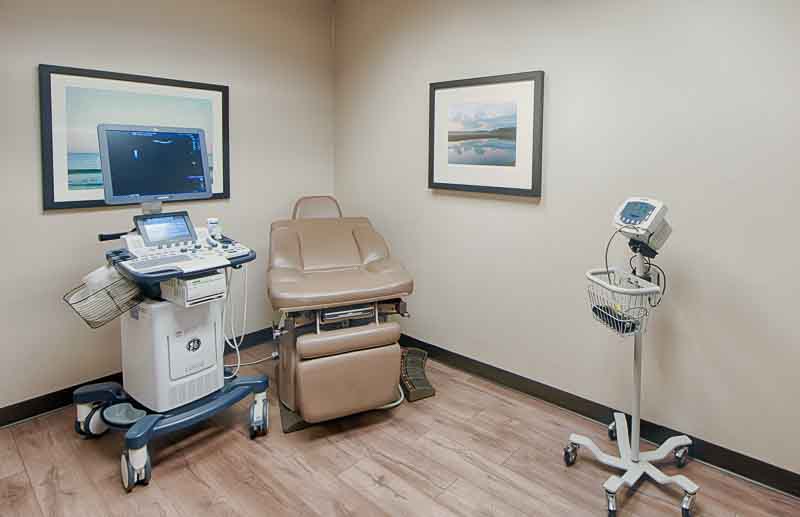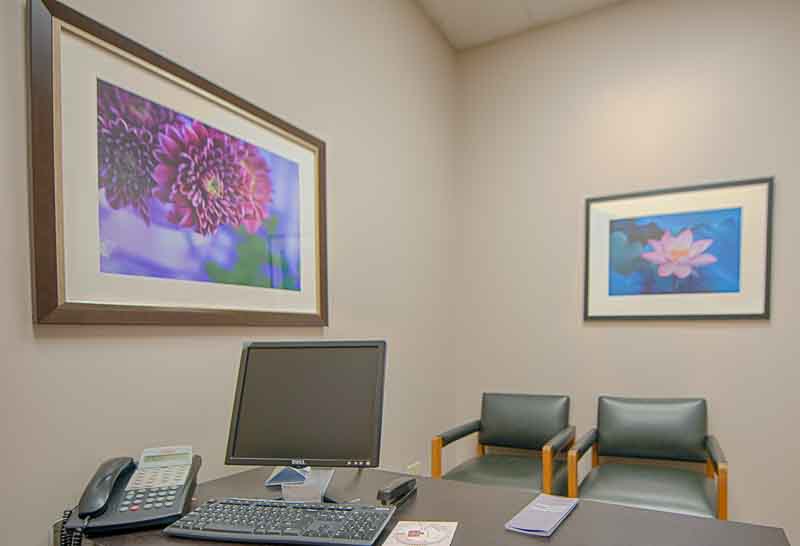Abortion Pill
Abortion Pill
Quality Compassionate Reproductive Health Care Personalized to Fit Your Needs
What is the Abortion Pill?
The Abortion Pill, also called the medication abortion, uses two kinds of of medication (mifepristone and misoprostol) to induce an abortion privately, safely and effectively in your own home. The abortion pill can be taken in early pregnancy, and is an alternative to the in-office surgical abortion procedure.
How Does the Abortion Pill Work?
Mifepristone is used with another prescription medicine called misoprostol, to end an early pregnancy, up to 12 weeks. Mifepristone is a pill that blocks progesterone, a hormone produced naturally by the body that helps maintain a pregnancy.
Misoprostol is taken 24-48 hours after the mifepristone. Misoprostol tells the muscles of the uterus to cramp, and softens the cervix so that the pregnancy tissue can pass.
Abortion Pill – Day 1
An ultrasound, lab work, and evaluation are performed in the office by our medical staff. The first pill, mifepristone, is taken in the office. You will leave with instructions for completing the process at home.
Birth control options will also be discussed and provided at this office visit if you want. You can become pregnant again right after having an abortion.
Abortion Pill – Days 2 & 3
24-48 hours later you will take the second medication, misoprostol, at home. You may be given two doses of this medication to take at home, 4 hours apart. This can help make the medication abortion more effective sometimes.
After taking this medication, you will have bleeding and strong cramping while you pass the pregnancy. You may also have nausea, vomiting and/or diarrhea. Plan to stay home for 12-24 hours.
Abortion Pill Follow up
3-4 days after your office visit we will text you a reminder to do a self-assessment. If you answer ‘NO’ to any of these questions, you must call our office. In 5 weeks you will take a pregnancy test.
If you or we are concerned that the medications did not work or if your pregnancy test is still positive 5 weeks later, you should return to our office as soon as possible. You may still be pregnant.
Schedule an Appointment
Prepare for Your Visit
Frequently Asked Questions

Frequently Asked Questions
Call us today to speak with our staff or schedule your appointment.
The abortion pill uses two medicines to cause a miscarriage and end a pregnancy. The medication abortion is a safe and effective way to end a pregnancy, up to 12 weeks in the privacy of your home.
This is a non-invasive procedure that feels more natural for some people. You can be with a spouse, partner, family member or trusted friend, for support with the medical abortion. Patients who want a less invasive procedure, prefer the medication abortion.
The first step involves an office visit, including an ultrasound, lab work and exam. Mifepristone ends the pregnancy. Pregnancies need a hormone called progesterone to grow and mifepristone stops your body from making this hormone.
Misoprostol helps your body pass the pregnancy and causes bleeding and strong cramping. 24-48 hours after your office visit you will take misoprostol and you must stay home for 12-24 hours. During this time, should rest until your bleeding and cramping is light.
A few days later we will ask you to think about your body’s response to the medications and do a self-assessment. This assessment is a series of four questions about your experience. If you answer ‘NO’ to any of these questions it is very important that you call us as soon as possible. You may need to return to the office to confirm that you are no longer pregnant.
Lastly, you will take a pregnancy test at home about five weeks later. We will give you a test to take home with you at your first visit in our office. If the test is negative you will know the medication abortion worked, and you are no longer pregnant. If your pregnancy test is positive five weeks after the abortion you may still be pregnant, or you may have become pregnant again. Call us immediately if this happens so we can schedule you for an office visit and additional treatment if needed.
The pain will be the worst after you take the second medication, the misoprostol at home. Cramps similar to heavy period cramps are common, and for some people the cramping and pressure can be very severe.
We will give you pain medication to help reduce your discomfort.
If you want to feel less cramping you can take one of the pain medications 30 minutes before taking the misoprostol. Take your pain medications on a regular schedule until your pain is gone or light. If you are not taking pain medication regularly, it will not help with your pain because it only works for 4-6 hours.
If you wait until you are in pain to take medications you will be in pain longer, because the pain medication takes time to start working.
Do not use any aspirin medications like Bayer, Excedrin, BC, or Goody’s. These medications can cause heavier bleeding sometimes.
Milder cramps, like period cramps or less, may last for a few weeks after you pass the pregnancy.
You could have heavy bleeding and cramping and pass clots after taking the abortion pill, but still be pregnant. Sometimes the pregnancy will keep growing after you take the ‘abortion pill’. Sometimes the pregnancy will end, but not pass out of the body. If you do not have any bleeding within 24 hours of taking misoprostol at home, please call us. You know your body best, if you do not think the medication worked call us so we can scheduled you for a follow up visit in our office.
3-4 days later, we will ask you to think about your body’s response to the medications and do a self-assessment. This assessment is a set of four questions about your experience. If you answer ‘NO’ to any of these questions it is very important for you call us. You may have to return to the office to make sure that you are no longer pregnant.
5 weeks later you will take a pregnancy test at home. We will give you a test to take home with you when we give you your medications. If the test is negative you will know the medication abortion worked, and you are no longer pregnant. If your pregnancy test is positive five weeks after the abortion you may still be pregnant, your hormone levels may be falling slowly, or you may be pregnant again. Call us immediately if this happens so we can schedule you for an office visit and additional treatment if needed.
The medication abortion does not work 100% of the time. After you take the abortion pill, we will ask you to do a few things to make sure that you are no longer pregnant.
3-4 days after you take the medication, we will text you a reminder to think about your body’s response to the medications. This self-assessment is four questions about your experience. If you answer ‘NO’ to any of these questions it is important that you call us as soon as possible. You may need to come back to our office to make sure that you are no longer pregnant.
You will also take a pregnancy test at home about five weeks later. We will give you a test to take home with you at your first visit when we give you the medications. If the test is negative, no more follow up is needed. If your pregnancy test is positive five weeks after the abortion you may still be pregnant, your hormone levels may be going down slowly, or you may be pregnant again. Call us immediately if this happens so we can schedule you for an office visit and more treatment if needed.
If you are still pregnant after you take the abortion pill, you have two options usually. You can take more medicine sometimes or have an in-office abortion procedure at FPA as long as you are less than 24.0 weeks pregnant.
Occasionally, only some of the pregnancy tissue will pass. If this happens you could have heavy bleeding, develop an infection, or both. An in-office suction procedure (D&C), more medications, more tests or treatments could help to prevent these complications.
Sometimes clots in the uterus can cause cramping and pain in the belly and/or lower back. If this happens, you may need a suction procedure (D&C) or more medication to help pass the clots.
If the medication abortion does not work, you will not be asked to make any extra payments to FPA. You must return to our office if you think that you are still pregnant or if our staff ask you to come back because we think you may still be pregnant. If you need to go to another clinic or hospital to complete the abortion for medical reasons or because you are more than 24 weeks pregnant, you will be responsible for the cost of that care. For this reason, we encourage you to come back to our office as soon as possible if you have any concerns that the medication may not have worked.
If you know that it will be hard or impossible for you to come back to our office, the medication abortion may not be the best choice for you.
You can exercise the day after you take the second medication at home. You should not exercise if you feel like you have not passed the pregnancy.
After you exercise, if your bleeding increases stop exercising. If this happens you should be less active and do not exercise again until your bleeding is lighter.
Your bleeding will be heaviest after you take the misoprostol at home on the second day. Your bleeding will change throughout the abortion process.
Until the pregnancy passes, the bleeding will usually be heavier than your normal period. You may see blood clots and pregnancy tissue pass.
Once the pregnancy has passed, the bleeding will start to slow down. You may bleed or spot for 4 to 6 weeks after the abortion. The bleeding can stop and start again many times.
When your bleeding has been light for 24 hours you can use a tampon instead of a pad.
Since 2020 more than half of abortions provided in the Unites States are done with medication instead of surgery. Approximately 1.75 million people in the U.S. and millions more worldwide have chosen the Abortion Pill to end a pregnancy. It is effective approximately 92-98% of the time. How well the medication works can depend on how far along you are in the pregnancy.
less than 7 weeks — Works about 98 out of 100 times the medication is taken
7 weeks — Works about 97 out of 100 times the medication is taken
8 weeks — Works about 95 out of 100 times the medication is taken
9 weeks — Works about 97 – 99 out of 100 times the medication is taken with two doses of misoprostol
10 weeks — Works about 97 – 98 out of 100 times the medication is taken with two doses of misoprostol
11 weeks — Works about 95 out of 100 times the medication is taken with two to three doses of misoprostol
12 weeks or more — Works about 92 out of 100 times the medication is taken with two to three doses of misoprostol
You will take the first medication, mifepristone, in our office on ‘day one’ after having an exam, ultrasound, lab work and signing consents. You can go to work, school or make other plans for the rest of that day. It is rare that you would start to bleed heavily or pass the pregnancy after taking the first medicine.
You should plan to be at home on ‘day two’ for at least 24 hours after taking the misoprostol (the second medication). Misoprostol helps your body pass the pregnancy by softening the cervix and causing the uterus to contract. You will have heavy bleeding, usually heavier than a period, and strong cramping. Because the bleeding and cramping is moderate to heavy for most women, you should not be at school or work while you are passing the pregnancy. In most cases you can return to work, school and your regular activities the next day.
In person follow up visits are rarely needed, but can be very important.
3-4 days after you take the medication, we will ask you to think about your body’s response to the medications and do a self-assessment. This assessment is a set of four questions about your experience. If you answer ‘NO’ to any of these questions it is very important for you call us. You may have to return to the office to make sure that you are no longer pregnant. You know your body best, if you do not think the medication worked call us so we can schedule you for a follow up visit.
5 weeks later you will take a pregnancy test at home. We will give you a test to take home with you when we give you your medications. If the test is negative you will know the medication abortion worked, and you are no longer pregnant. If your pregnancy test is positive five weeks after the abortion you may still be pregnant, your hormone levels may be falling slowly, or you may be pregnant again. Call us immediately if this happens so we can schedule you for an office visit and additional treatment if needed.
If the medication abortion does not work, you will not be asked to make any extra payments to FPA. If you go to another clinic or hospital for evaluation or to complete the abortion, you will be responsible for the cost of that care. For this reason, we encourage you to come back to our office as soon as possible if you have any concerns that the medication may not have worked.
If you know that it will be hard or impossible for you to come back to our office, the medication abortion may not be the best choice for you.



